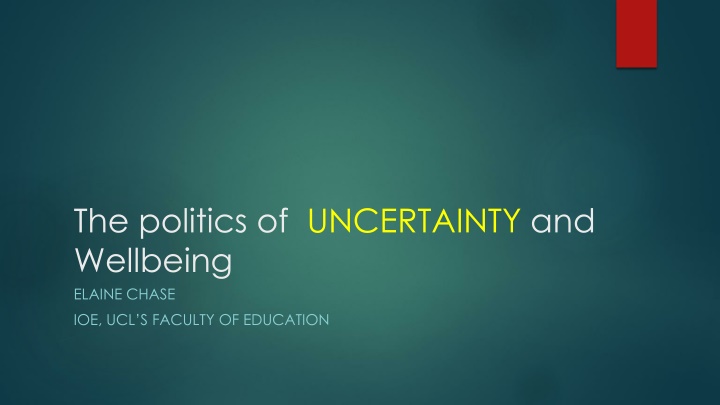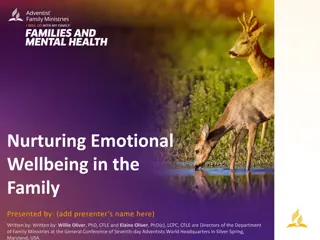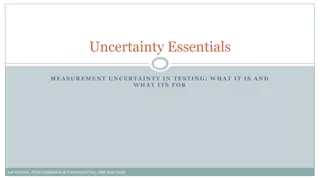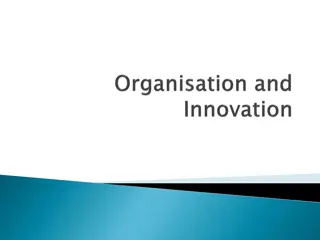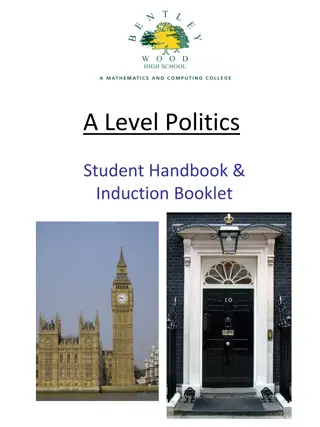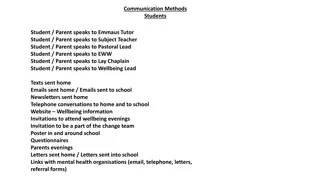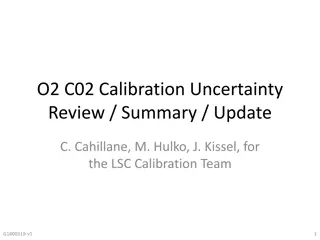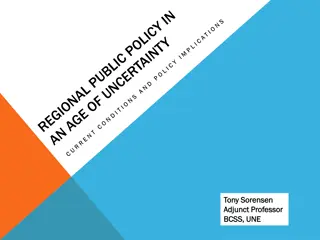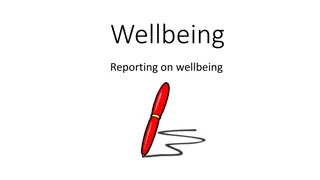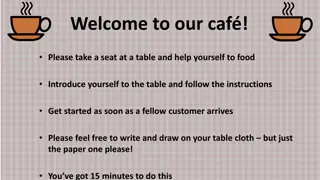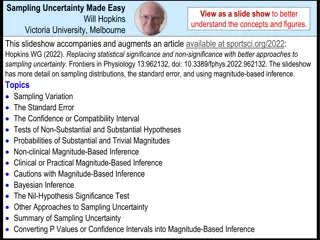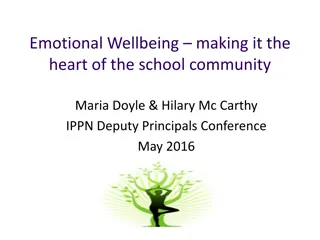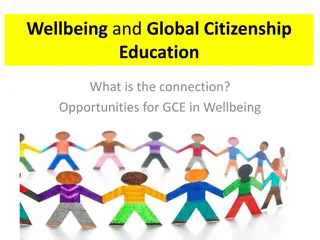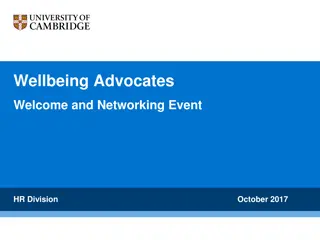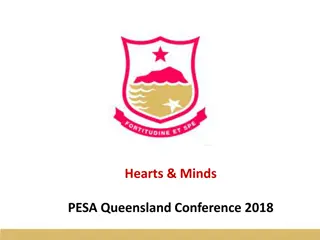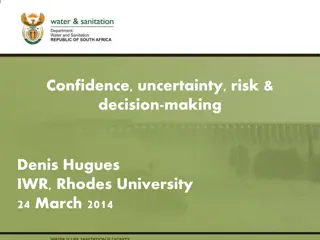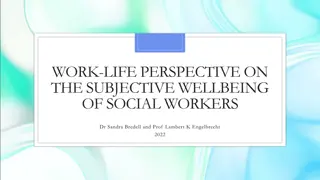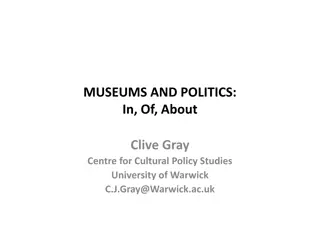The Politics of Uncertainty and Wellbeing - Challenges and Implications
Intersection of uncertainty and wellbeing in the context of migration and asylum, this content discusses the impact of political constructs, slow processes, and waiting periods on individuals' sense of identity and stability. It addresses the implications for research, policy responses, and the significant impact on overall wellbeing, drawing attention to the complex dynamics of living in protracted limbo and navigating ontological security in the face of uncertainty.
Download Presentation

Please find below an Image/Link to download the presentation.
The content on the website is provided AS IS for your information and personal use only. It may not be sold, licensed, or shared on other websites without obtaining consent from the author.If you encounter any issues during the download, it is possible that the publisher has removed the file from their server.
You are allowed to download the files provided on this website for personal or commercial use, subject to the condition that they are used lawfully. All files are the property of their respective owners.
The content on the website is provided AS IS for your information and personal use only. It may not be sold, licensed, or shared on other websites without obtaining consent from the author.
E N D
Presentation Transcript
The politics of UNCERTAINTY and Wellbeing ELAINE CHASE IOE, UCL S FACULTY OF EDUCATION
The situation over here is bad, I am tired of waitingwe are left here with an uncertain future. It seems no one cares about us in here. We want the authority to process our applications, how long do we have to wait like this?...It s a slow process and already waiting nine months. Nobody ask for us and no interview, nothings is happening .I am slowly losing hope now and I really getting stressed about everything. I don't really know what is happening and I do not know long it's going to take to make decision about me, to send me somewhere therefore I have uncertain future here and I don't know what will happen. (Jamal) Two years later: UNHCR refugee status . Living in hostel; no right to work still waiting.
Migration and asylum Uncertainty, insecurity and wellbeing Policy responses Hostile environment Medicalising uncertainty The politics of uncertainty Implications for research Purpose Positionality Ethics Acompa amiento
Researching UNCERTAINTY Becoming Adult research project (www.becomingadult.net) LOHST project (https://livesonhold.org/) Life Facing Deportation Project (https://www.deporting-lives.co.uk/) Profound UNCERTAINTY / protracted limbo Challenges in access to legal due processes, support and services Significant impact on wellbeing
UNCERTAINTY and wellbeing theoretically Ontological security (Giddens) Sustaining a sense of identity in context of late modernity - typified by change, turmoil and uncertainty A core autonomous self that transcends time, place and context Able to relate to others without having sense of threatened identity Order, routine, stability Ontological insecurity (R.D. Laing 1965) inability to sustain a biographical narrative Sense of coherence; Life is predictable, manageable and meaningful (Antonovsky 1979) Research to date: Wellbeing linked to viable futures (for self and others) Insecurity / limbo/ uncertainty destabilising to wellbeing
UNCERTAINTY politically constructed Time limited protections for unaccompanied children and young people arriving alone to claim asylum Unable to establish a well-founded fear of persecution (UN Convention) UASC leave in UK since 2013 Immigration status determines access to social care, welfare support, education and other services Uncertainties in status = uncertainty across all aspects of life Turning 18 can mean homelessness, destitution, possible detention / deportation; or disengaging from welfare services Waiting/ uncertainty for more than a decade Highly negative impacts on physical and mental health Impacts of Covid-19 -exacerbating uncertainty
De-politicised responses Arbitrary allocation of social care and welfare support Wide variation across geographic contexts Impacts of austerity measures Serendipitous access to quality legal advice and guidance Contextualised by systematic cuts to legal aid Ignoring how practices of care and resources are shaped by migration governance policies Devolved powers of Home Office Everyday bordering health, education, social care provisions (Yuval- Davis 2018)
Medicalising UNCERTAINTY Impacts of uncertainty on wellbeing linked to former trauma and turmoil Ignoring post-migration stressors. In my point of view the stress release tablets, they won t help in this sort of situation because the thing is you have to think about it. Because the main thing is that if you get refused and the Home Office would like to send you back home. And you can t stop thinking about it even if you take a tablet or anything so in the end, the tablets won t help. The thing is you need to get your document and settled down and establish your life here. And if they say no to you, you keep thinking about that what to do now to get your documents yeah? How to live, where to get support from so these are the things you have to do whether you take the tablet or not. And if these things get sorted, you don t need a tablet ! (Kushan, Afghanistan) (Chase, Rezaie, Zada 2019) Medicalising policy problems
Politicising UNCERTAINTY Sociological imagination (C. Wright Mills) Translating personal daily troubles into social issues Power and the power elite Analysing macro-level factors shaping uncertainty Capabilities approach: opportunities/freedoms to be and do the things people value Negative freedoms around protection from harm Positive freedoms/ agency expansion Opportunities for personal fulfilment ; dignity ; dreams and aspirations BUILDING FUTURES Understanding the process elements of what people can/ can t do
Politicising research on UNCERTAINTY Viewing UNCERTAINY through a political lens raises questions of how we conduct research Why are we there ? How we position ourselves? What value do we bring? How can we keep research meaningful in contexts of uncertainty? What ethics underpin the research we do?
Acompaamiento Tied to ideas of liberation theology (Freire 1970, Gozuieta 2001) Notion of walking alongside others in a show of solidarity and resistance in the face of oppression. Empathy and justice Commitment to affirming people s humanity, dignity and personhood Intrinsically political. Aligned with a feminist ethos of care (Edwards and Mauthner 2012) Social contract (or Acci n Social) in the pursuit of justice Raises fundamental questions of why, what and how we research
Acompaamiento and research Life Facing Deportation project: Contexts of Guatemala, Mexico and USA border Violent migration governance - imposing immobility, liminality - politically induced precarity (Butler 2006) Acompa amiento and research Driven by the needs and desires of those whose lives we are documenting and in ways which are most meaningful to them Centring human experience Research which is vigilant and responsive to what is happening at a particular point in time Deportation/detention: from documenting to mobilising opposition Researchers as privileged allies
Example: Acompaamiento in Mexico (Valentina Glockner) In November 2018, Norman (17) and Edilson (15) from Honduras were traveling through northern Mexico as part of the first migrant caravan crossing the country to reach the border with the United States. They had been driven from their native countries by intersecting crises: environmental degradation and food insecurity, civil war and organized crime. Very close to achieving their objective, both were detained by Mexican authorities and transferred first to a migratory station and then to a government shelter for unaccompanied migrant children. They reported that before being sent to the children s shelter, Mexican authorities had coerced them into signing their own deportation certificates, without listening to why they had fled Honduras and wanted to request asylum in the United States. Within days a National Migration Institute (INM) representative had purchased plane tickets to send all young people at the shelter back to countries of origin. Norman and Edilson decided to rebel and escaped from the government shelter. I met Norman and Edilson the next day. They were hiding in a church and parishioners had promised to protect them from the police, immigration and child protection officers. We met thanks to a network of scholars and activists accompanying and monitoring the caravan, which by then had already reached the Tijuana / San Diego border and which the boys had contacted via a hidden cell phone. During the next two and a half months, I carried out an acompa amiento and documentation process designed to defend Norman and Edilson's right to migrate, as well as their right to seek asylum in the United States. This resulted in Norman and Edilson reaching the Nogales-Sonora border where they were admitted by Customs and Border Protection (CBP) authorities as unaccompanied children seeking refuge in early 2019. At the end of 2020 Norman won his case for asylum in an immigration court and in June 2021 he graduated from high school while working at a restaurant. Edilson is studying and working, and will soon turn 18. His asylum case is being supported by pro bono lawyers from a child-advocacy, non-profit organisation.
Acompaamiento: Solidarity network of NGO activists, academics, advocates, lawyers, students, government officials, and family and friends - Spontaneous response to Edilson and Norman s immediate needs. - An extension of work as a researcher and anthropologist - Producing forms of documentation that make possible the defence of the right to migrate, as well as construct a collective memory of the ways in which the current migratory regime violates the human rights of migrants and asylum seekers. - Recording the knowledge, experiences and participation of children and young people, recognising them as fundamental actors of contemporary migration. - Research as an instrument for the construction of social justice - Research as fluid, responsive to the uncertain and changing needs of people and context.
Animation: Dear Habib https://www.youtube.com/watch?v=_WdprHcOuJU
References Chase, E. & Allsopp, J. (2021) Youth Migration and the Politics of Wellbeing: Stories of life in Transition. Bristol: Bristol University Press Chase (2020) Transitions, capabilities and wellbeing: how Afghan unaccompanied young people experience becoming adult in the UK and beyond, Journal of Ethnic and Migration Studies, 46:2, 439-456, Chase, E. (2013) Security and Subjective Wellbeing: The Experiences of Unaccompanied Young People Seeking Asylum in the UK. Sociology of health & illness 35.6 (2013): 858 872 Chase, E. Rezaie, H. and Zada, G. (2019)Medicalising Policy Problems: The Mental Health Needs of Unaccompanied Migrant Young People. The Lancet (British edition) 394.10206 (2019): 1305 1307. Glockner, V., Flores, W., Chase, E., Allsopp, J., Warwick, I., Zion, D., Blitz, B., Muniz-Trejo, R., Van Tuyl, P. and Cheng, T. (2022 in press). The theoretical and practical potential of acompa amiento for research with people marginalised through immigration controls. In Benhadjoudja, Leila, Christina Clark-Kazak, St phanie Garneau and Anahi Morales Hudon, eds. (Forthcoming). Being migrant, racialized or Indigenous in times of crisis . Ottawa: University of Ottawa Press.
